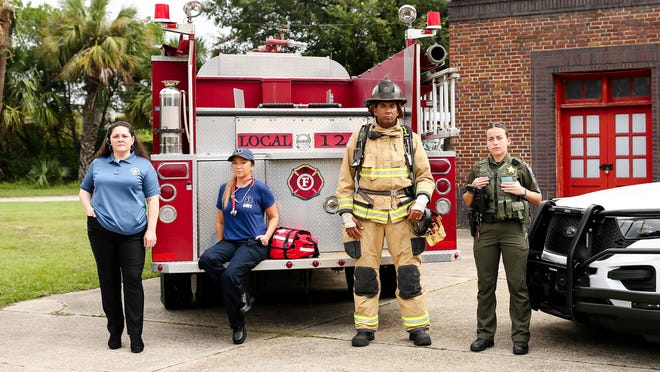
National First Responders Day recognizes the heroes called upon to assist and often save us during times of trauma and crisis.
Held annually on Oct. 28, the day honors those dedicated to serving the public 24 hours a day, seven days a week. These are the people who run in while most of us are running out.
According to the Centers for Disease Prevention and Control and Prevention, more first responders die from suicide than in the line of duty. Describing suicide as a complex health issue complicated by socio-demographic, medical, economic and occupational factors, the CDC underscored that because first responders are under acute and chronic occupational stress, they’re at a greater risk for anxiety, depression, substance abuse and post-traumatic stress.
According to Blue HELP, more than 850 U.S. first responders have committed suicide in 2024. Sixty-one of those deaths were Floridians. And yet, despite those grim statistics, suicide rates for first responders are declining, a fact that industry professionals attribute to a growing awareness and implementation of mental health support programs.
Under the direction of Dr. Christine Cauffield, LSF Health Systems, a state-funded, nonprofit behavioral health service, is addressing the mental health service needs of first responders through its First Responder Peer Support Program, which provides confidential, free mental health services to current and former first responders.
Services, provided by contracted behavioral health care providers include prevention, intervention, treatment and care coordination. The program also serves family members of current or former first responders, even if the first responders are incapable of helping themselves.
Funded by the Florida Department of Children and Families, current and former first responders along with members of the military are trained as peer specialists who listen, offer support and identify resources available to those in need. In addition to the boots-on-the-ground experience, peer support specialists undergo 144 hours of mental health education and training in stress management, suicide assessment, burnout, dependency abuse or addictive behavior, substance abuse screenings and self-care.
According to Cauffield, peer support specialists understand the life of a first responder because they too have walked in the shoes of first responders. Those in need simply dial 211 and identify themselves as a current or former first responder or a family member. Callers are screened then connected to a trained, first responder peer specialist within 24 hours. Peer specialists work one on one through a long-term plan that includes follow-up check ins. All calls remain confidential.
“While some departments have their own peer support programs, many first responders don’t feel comfortable talking to someone within their own department,” Cauffield said. “LSF Health Systems offers a private, external option for those who need support.”
Cauffield explained that because chronic, cumulative trauma becomes encoded within our DNA, we are affected physically, emotionally and spiritually. This program is designed to breakdown the stigma surrounding mental health, especially for those who deal with response trauma on what could be a daily basis.
“The First Responder Peer Support Program allows those dedicated to the call of duty stay fit for duty,” Cauffield said. “Staying fit for duty means caring for one’s mental and emotional health too.”
“We’re recognizing more than ever how vital mental health support is within the first responder community,” said Assistant Chief Karem Scott-Kotb of Alachua County Fire Rescue. “By implementing peer support programs, we’re not only breaking the stigma around seeking help, but also giving first responders the tools they need to manage stress and stay mentally strong throughout their careers.”
Now in its third year, LSF Health Systems has worked with almost 3,500 first responders and their family members through the 211 call line. Florida’s First Responder Peer Support Program covers 20 counties in Northeast and Northern Central Florida, including Alachua, Baker, Bradford, Clay, Columbia, Dixie, Duval, Flagler, Gilchrist, Hamilton, Lafayette, Levy, Madison, Nassau, Putnam, Suwannee, St. Johns, Taylor, Union and Volusia.
First responders and family members can visit StayFitforDuty.org or call 211 to be connected with a peer specialist. All calls remain confidential.
“I encourage all first responders to reach out for help,” Cauffield said. “First responders deserve to live a hope-filled life.”
Headquartered in Jacksonville, LSF Health Systems is a behavioral health Managing Entity (ME), contracted by the Florida Department of Children and Families, dedicated to overseeing mental and behavioral healthcare for people who face poverty and are without insurance. For more information, visitwww.lsfhealthsystems.org
The Daily Briefing: Get the latest St. Augustine news in your email each day. Sign up for The Record’s newsletter.
